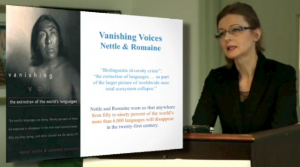Center Director Dr. Brutt-Griffler gave a plenary talk entitled Encounters with English: Present-Day English in a Multilingual World at International Linguistic Association (ILA)’s 58th Annual Conference with the theme of ‘English–Global and Local’ in New York on April 12, 2013. Abstract of the talk follows: The epoch of ‘globalization’ is characterized by the intensified transnational […]

Center Director Dr. Brutt-Griffler gave a plenary talk entitled Encounters with English: Present-Day English in a Multilingual World at International Linguistic Association (ILA)’s 58th Annual Conference with the theme of ‘English–Global and Local’ in New York on April 12, 2013.
Abstract of the talk follows:
The epoch of ‘globalization’ is characterized by the intensified transnational migrations of people, the products they make, and the languages they speak. In hurling nations into competition on the world market and people into collision on the job market, it throws languages into contact. The linguistic consequences of that language contact are as complex and multidimensional as they are profound and dramatic. On the one hand, speaking a second language opens up opportunities not merely for crossing societal borders temporarily but perhaps even permanently, permitting the exit from one social identity and entry into another. No language confers such benefits more than English, called variously a world language, an international language, or a lingua franca to call attention to its unique role in a globalizing late modernity. On the other hand, scholars of what has come to be called language endangerment predict that anywhere from fifty to ninety percent of the world’s more than 6,000 languages will disappear in the twenty-first century. My goal is to assess the validity of such claims using empirical data on language spread and offer another perspective. I suggest that the threat to the world’s endangered languages stems from a very different source—locally dominant and particularly national languages. These findings offer a cautionary note to the uncritical adoption of political analyses in linguistics and applied linguistics, however seemingly compelling the cause they espouse.



